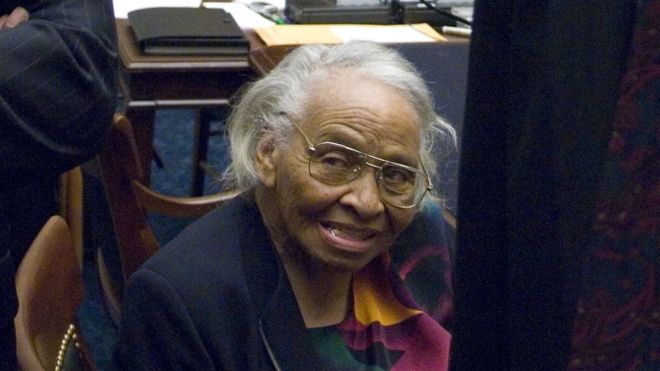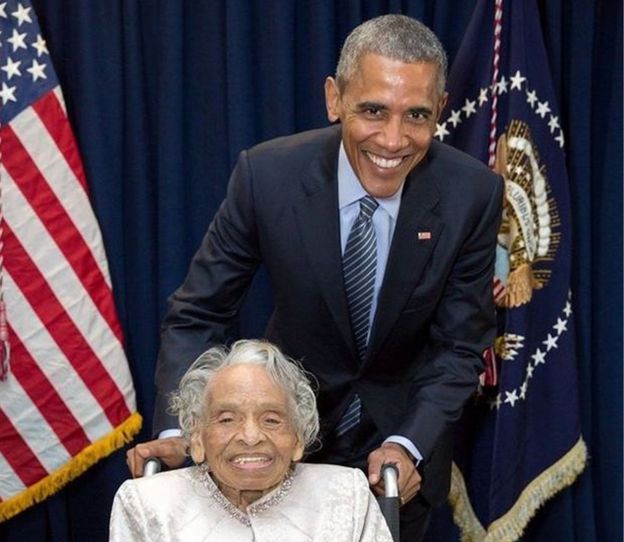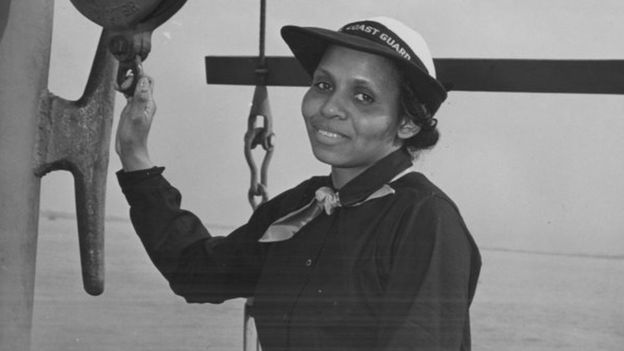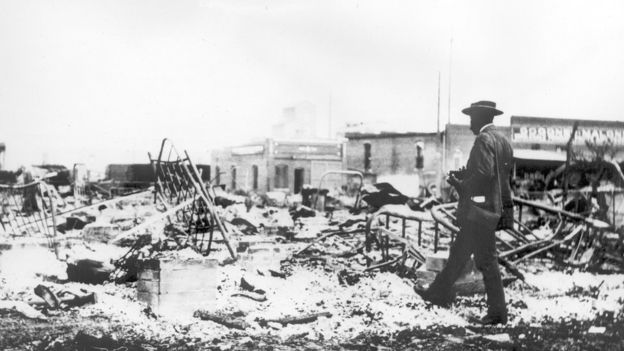Olivia Hooker: Tulsa race riot survivor dies aged 103
Sun 25 Nov 2018, 11:38:18
When Olivia Hooker was six years old, she was forced to hide under a table as a white mob destroyed the neighborhood around her.
Later, she would recount how she struggled to stay silent as the torch-carrying men took an axe to the family piano. Outside, as many as 1,000 homes and businesses - including her father's clothes store - were being reduced to rubble.
The 1921 Tulsa race riot, as it would become known, would also leave as many as 300 black people dead.
But the horrifying incident in Oklahoma would be far from the only distinguishing moment of Ms Hooker's remarkable life.
In her 103 years, she would become the first African-American woman to join the US Coast Guard, go on to gain a PhD and eventually play a key role in getting some justice for the victims of the race riots, more than 70 years after the fact.
She would be praised as a "tireless voice for justice and equality" by America's first black president, and called "a national treasure" by the head of the US Coast Guard.
'The terrible catastrophe'
Ms Hooker, who died on Wednesday at home in White Plains, New York, thousands of miles and almost 100 years away from the riots in Tulsa, was born in Muskogee, Oklahoma, in February 1915.
By the time she was six, the family had moved to Tulsa, where her father had "a very nice store" which "didn't carry shoddy things".
They lived in Greenwood, an affluent African-American area known as "Black Wall Street".
But on 31 May, 1921, it would become the scene of America's worst race riot - sparked by rumours a black man had assaulted a white woman in a lift.
The first Ms Hooker knew of it was when she saw men carrying burning torches entering their back garden. It was then, she told US radio network NPR, her mother hid Ms Hooker and her three siblings under a table.
The mob destroyed the piano, and her dolls' clothes, but that was not what Ms Hooker was most affected by the day she would later refer to as "the terrible catastrophe in Tulsa".
"To me, I guess the most shocking thing was seeing people to whom you had never done anything to irritate, who just took it upon themselves to destroy your property because they didn't want you to have those things, and they were teaching you a lesson," she told NPR.
Her family did not stay in Tulsa after the riot. Instead, they moved somewhere the children could grow up safely, with Ms Hooker eventually qualifying as a teacher with a degree from Ohio State
University.
University.
And then, with World War II raging around them, President Franklin D Roosevelt opened up the female military corps to minorities.
Ms Hooker knew exactly what she had to do: initially rejected by the Navy's Women's Reserve, she joined the Coast Guard's Women's Reserve, known as Spars, in 1945.
She was the first black woman to do so.
"It was not easy for Miss Hooker to take the step of enlistment," recruiter Lt Margaret Tighe would write on her enlistment.
"She is the first Negro woman to be accepted by the Spars, and is in full realization of this fact. She feels a sincere desire to serve and further feels that she is opening a field for the young women of her own race."
However, it seems Ms Hooker had other worries on her mind.
"I wasn't telling my mother because I thought she would fly off the handle," she told Google earlier this year.
"When the day came, I said mum, let's have a cup of tea. To my amazement, she said, if I were a young lady, I would have been in long ago."
Her role mostly involved "preparing discharges for the numerous Coast Guardsmen returning from the war and rejoining civilian life", the Coast Guard explained.
By the next year, the Spars were disbanded. But her time in the coastguard began to open other doors. Thanks to her GI benefits, she was able to get a masters from Columbia University, followed by a PhD in psychology from the University of Rochester.
Later, in the 1960s, she began to work as a professor at New York's Fordham University.
Then, in 1997, she was a founding member of the Tulsa Race Riot Commission. Four years later, the commissions findings would pave the way to finally acknowledging the true scale of what happened in Greenwood.
It is of little surprise then that former President Barack Obama would describe her as "an inspiration" in 2015.
"She has been a professor and mentor to her students, a passionate advocate for Americans with disabilities, a psychologist counseling young children, a caregiver at the height of the AIDS epidemic, a tireless voice for justice and equality," Mr Obama told the Coast Guard's class of 2015 as she sat in the front row.
Indeed, this was a woman who took up volunteering with the Coast Guard Auxiliary aged 95, still speaking to journalists about her remarkable life - and the lessons it held - into her 103rd year.
As for what kept her going, Ms Hooker had a simple answer: "It's not about you, or me. It's about what we can give to this world."
No Comments For This Post, Be first to write a Comment.
Most viewed from International
Most viewed from World
AIMIM News
Latest Urdu News
Most Viewed
May 26, 2020
Do you think Canada-India relations will improve under New PM Mark Carney?
Latest Videos View All
Like Us
Home
About Us
Advertise With Us
All Polls
Epaper Archives
Privacy Policy
Contact Us
Download Etemaad App
© 2025 Etemaad Daily News, All Rights Reserved.





.jpg)
.jpg)
.jpg)
.jpg)




.jpg)
.jpg)


.jpg)
.jpg)
.jpg)
.jpg)
.jpg)
.jpg)
.jpg)
.jpg)
.jpg)
.jpg)
.jpg)
.jpg)

















